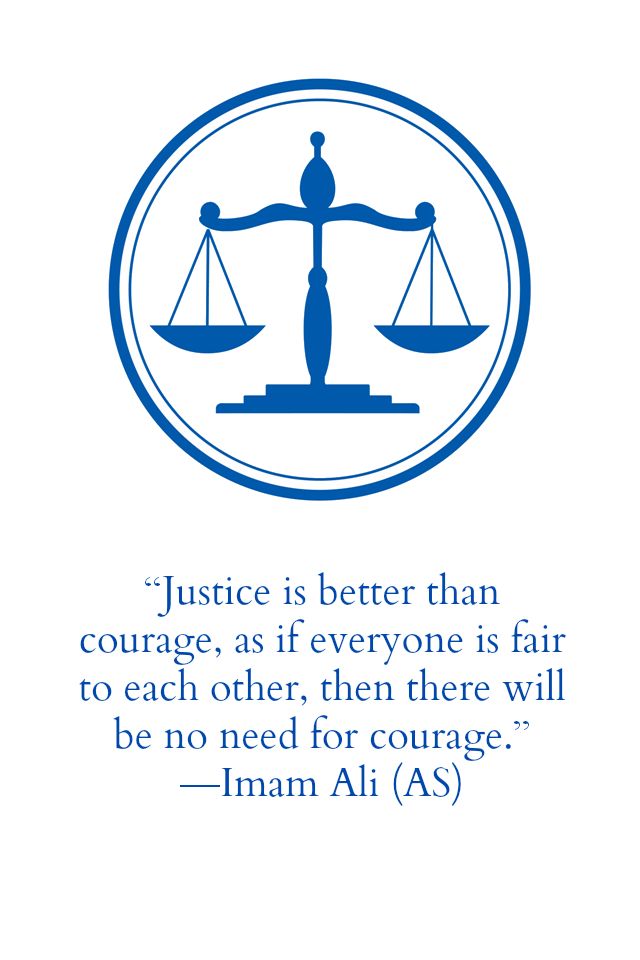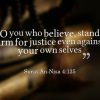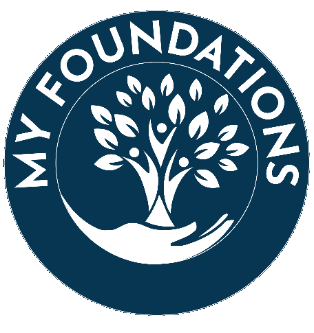- Phone No.: +44 7920015304
- Email:info@theislamicemailcircle.com
Practise of justice is such an important Islamic requirement that the Messenger of Allaah gave detailed instructions on how to ensure that justice is carried out. There are many other Hadeeth in which the Prophet PBUH emphasised the need to listen to both parties properly before arriving at a decision, basing the decision on evidence, not on claim and not giving a verdict or passing a judgement when angry. Justice is not possible without credible witnesses, hence he emphasised on the need of presenting a true witness, as well as provided guidelines for accepting witnesses and oaths. For example:
“The witness from the following is not acceptable: A dishonest man or woman, a fornicator, male or female, and a person who has animosity against the accused brother. Similarly, a witness of a dependent, in favour of his provider will also be rejected.” The ProphetPBUH taught people that giving false witness is as grave and an unforgivable a sin as Shirk (equating others with Allaah). He also said: “The gravest of the grave sins are: Equating others with Allaah, disobeying parents and taking a false oath. When a person takes an oath and adulterates it with as little a falsehood as the wing of a mosquito, it keeps his heart stained until the day of Judgement.” (Abdullah Ibn Unais in Al-Tirmidee).
The Prophet PBUH not only taught about justice, he demonstrated it by practise and lived it. Nowhere were people accustomed to witness justice being done so seriously as to judge against one’s own people. He surprised everyone when he judged in favour of a Jew of an enemy tribe against his own follower. He would even present himself for justice: The Messenger of Allaah was distributing things among people, a person rushed in and bent upon the Prophet (instead of waiting for his turn gracefully). The Prophet PBUH poked him with a palm stick he had with him. The poking caused a laceration on his face.
The Prophet PBUH immediately presented himself to that person so that he could avenge. The person responded by saying, “I forgave you, O Messenger of Allaah.” Justice is compromised when the powerful, rich and famous of the society are treated leniently by the law enforcement authorities. He set the example of applying law equally and seriously to everyone who violated it. A woman named Fatimah, of a respectable family of Bani Makzoom, committed theft and was to be punished.
The dearest people to the Prophet PBUH were persuaded to seek pardon from the Prophet for that woman. It made him angry and he said, “O people! Those before you went astray because they let go the influential, while the common folk were punished. By Allaah, had it been my own daughter, Fatimah, I would have cut her hand as well.” (Reported in Bukhari and Muslim). That is why Muslims are known as the exemplary enforcers of justice in this world. In fact, they are so distinguished in establishing justice that many people would become Muslims if they see the immaculate justice of the Muslims in the world today.
Allaah is Just, deals with people justly, and loves those who establish, maintain or stand up for justice. He has also created human beings with a propensity and liking for justice. Normally people like to be fair and equitable unless their innate tendency towards justice is overshadowed by their own self-interest, their love of their own, their loyalties, their biases, their prejudices, their arrogance of power, their anger or hate towards some people or their desire for revenge. One of the primary goals of Islam being the establishment of an ideal peaceful and fair society, justice has been emphasised in the Holy Qur’aan. Knowing how people drift towards injustice, the Qur’aan advises Muslims to let justice triumph over all other emotions, feelings and attitudes. Muslims are told:
“O believers, be the enforcers/establishers of justice, giving witness for the sake of Allaah, even if it is against yourselves, your parents or your kith and kin. Whether they are rich or poor, Allaah has more rights than any one of them. Do not let pursuing your desires come in the way of being just.” (An-Nisa. 4:135).
“O believers, be the enforcers/establishers of justice, giving witness for the sake of Allaah, and do not let your animosity towards people incite you against practising justice. Be just! That is the pious way.” (Al-Maidah 5:8).
Justice is the first victim when an individual, a community or a State is overtaken by self-interest, favouritism for their own or by anger, revenge or hate against others. When that happens, the party on the receiving side of injustice, reacts with similar attitude, perhaps even more strongly. Each party’s effort to get back more forcefully grows into a spiralling cycle of violence and terrorism. This ends up making the peace and security of humanity the ultimate victim of injustice.
That is why there can be no peace in this world without justice. As there can be no peace in the world without justice, it is in humanity’s own self interest to establish justice so that everyone can live in peace. Fear of the powerful or terror from the powerful can accomplish temporary peace, but sooner or later the pent-up feelings of the aggrieved, explode, shattering the façade of peace out of fear. Permanent peace can be accomplished only through justice. That is why justice and fairness have been given crucial importance in Islam.
Even when reconciling two parties, Allaah wants the reconciliation to take place in such a just way so that the wronged party is duly compensated by the aggressive party, so both parties feel that it has been a fair deal. Often, when reconciling among people, some pressurise the weaker party to forgive and forget without doing justice. That is not acceptable to Allaah. He commands:
“Then make reconciliation between them with justice and be equitable. Indeed Allaah loves those who are equitable.”
(Al-Hujurat 49:9)
Karima-DDN
The Islamic Email Circle Copyright 2024 - All Rights Reserved





Leave Your Comments